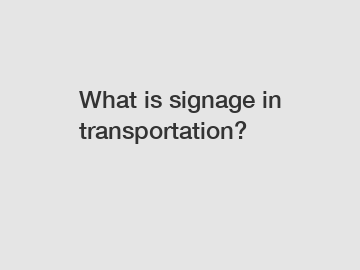What is signage in transportation?
What is signage in transportation?
Signage plays a crucial role in ensuring the smooth and safe flow of transportation. It encompasses all the visual cues, symbols, and messages displayed prominently in various transportation modes, including roads, airports, train stations, and bus depots, among others. This article aims to explore the significance of signage in transportation and how it contributes to the overall functionality and safety of these vital systems.
1. Enhancing Road Safety:

One of the primary functions of signage in transportation is to enhance road safety. Traffic signs, such as stop signs, speed limit signs, and warning signs, provide essential information to drivers, ensuring they adhere to specific regulations and drive safely. These signs help in preventing accidents, reducing traffic congestion, and improving overall road conditions.
2. Facilitating Navigation:
Signage plays a crucial role in helping people navigate through transportation networks. Road signs, airport signs, and train station signs guide travelers to their desired destinations, ensuring that they can reach their intended locations without confusion. Clear and well-placed signage also promotes efficiency within transportation systems by reducing the time wasted in searching for the correct routes or terminals.
3. Conveying Important Information:
Signage is an efficient tool for conveying important information to the public. In transportation, signs provide information about upcoming exits, parking areas, boarding gates, baggage claim areas, and more. These signs ensure that travelers are well-informed about the facilities, services, and regulations associated with their journey, leading to a smoother and more convenient travel experience.
4. Supporting Accessibility and Inclusivity:
Signage in transportation systems contributes significantly to creating accessible and inclusive environments. By incorporating universal design principles, signs can include symbols and text that cater to individuals with disabilities or those who have limited language proficiency. This ensures that everyone, irrespective of their abilities, can navigate transportation networks independently and confidently.
5. Directing Emergency Response:
Signage in transportation also plays a crucial role during emergencies. In cases of natural disasters, accidents, or unforeseen events, signs can provide directions for evacuation routes, emergency exits, and safe areas. By using clear and concise language with universally recognized symbols, signage facilitates effective emergency response, keeping people safe and minimizing the potential for panic or confusion.
6. Promoting Branding and Commercial Messaging:
Transportation signage also serves a marketing purpose. Airports, bus terminals, and train stations often display advertising signs, fostering brand awareness and generating revenue for transportation authorities. These signs can provide travelers with valuable information about local businesses, tourist destinations, or upcoming events, adding value to their overall journey experience.
In conclusion, signage in transportation proves to be indispensable, serving multiple functions that contribute to the efficiency and safety of transportation systems. From enhancing road safety to supporting navigation and accessibility, signage ensures that travelers have access to essential information for a seamless journey. Furthermore, signage plays a significant role in emergency management and can even generate revenue through commercial messaging. By continuously improving and maintaining signage, transportation authorities can further enhance the overall experience for commuters and travelers alike.
For more information, please visit led speed limit sign, vms sign board, lane control signal.


